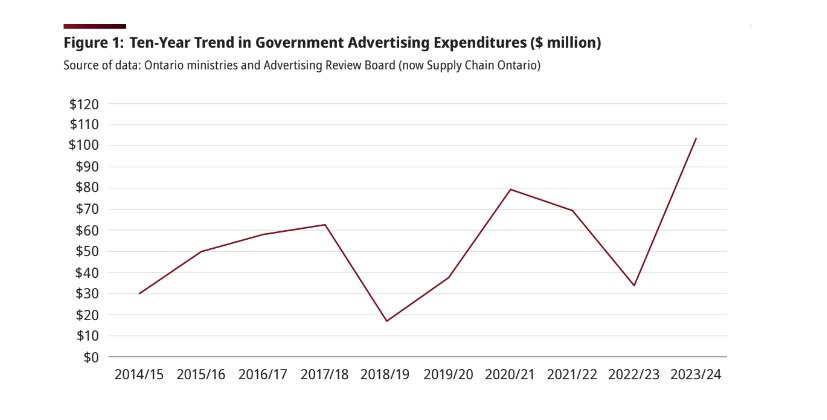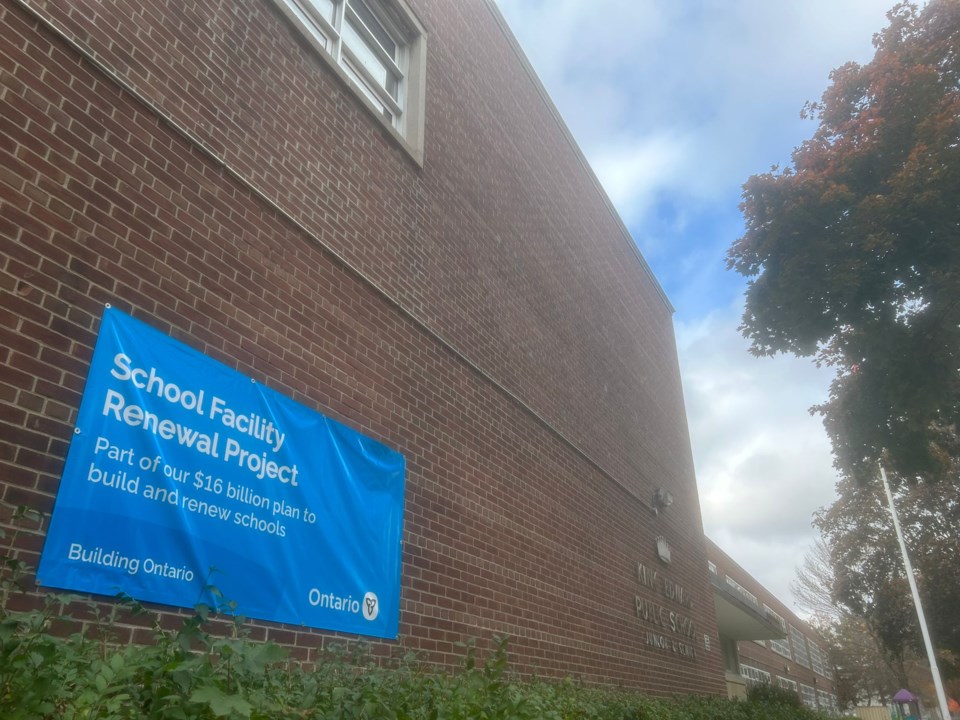EDITOR’S NOTE: This article originally appeared on The Trillium, a new Village Media website devoted exclusively to covering provincial politics at Queen’s Park.
The Doug Ford government spent three times as much on advertising last fiscal year compared to the year before, with more than 60 per cent of that funding going toward partisan advertising.
This is “the most the government has ever spent on advertising in a year,” the province’s auditor general wrote in her annual report released Tuesday.
Between April 1, 2023, and March 31, 2024, the Progressive Conservatives spent at least $103.5 million on ads. A good portion of that — about $43.2 million — was spent on the “Let’s Build Ontario” campaign, which included television advertisements in “expensive time slots,” including during NHL games and the Super Bowl.
Auditor General Shelley Spence reports that those “It’s Happening Here” ads, which say that “more people are working than ever before” while touting Ontario’s economy and way of life, cost about $18.8 million as of March 2024. The ads began running in early 2023 and continue to be aired.
These ads were particularly controversial given their high-profile airing times, with opposition parties criticizing the government for spending millions of taxpayer dollars on television ads promoting the PCs’ accomplishments.
Liberal MPP John Fraser has argued that it was not a good use of money, especially as the province undergoes an affordability crisis.
"It's taxpayers' money, and if families are struggling, why would we waste money on trying to tell you that life was different than it actually was?" Fraser said last month. "Why would a government do that?"
Spence noted that it’s not unusual to see government advertising increase in the lead-up to a provincial election. Spending on ads peaked in 2017-2018 and then again in 2021-2022 before dipping again. The Progressive Conservatives haven’t publicly confirmed they will hold an early election but have not ruled it out.

The report says that of the top 10 campaigns launched by the Progressive Conservatives this year, half would be considered partisan under the old Government Advertising Act, which prohibited tax dollars from being spent on advertising meant to foster a positive impression of the government.
In 2014, the then-Liberal government amended the legislation so the auditor general could only veto an ad as partisan if it clearly mentions the political party, uses their colour or associated logo, directly criticizes another party or member, or uses the image, name, or voice of an elected representative.
It’s a change that the PCs criticized at the time, but have not made any moves to change once in power.
The five campaigns were flagged by the auditor general as partisan because “their primary purpose” was to promote the governing party and “would not have been approved by our office” under the original legislation.
“If an ad item does not contain any of these features, no matter what else it may communicate, it qualifies as non-partisan and our office is bound by law to approve it,” the report says. “Even if factually inaccurate, we have to approve the advertisement.”
Speaking with reporters late Tuesday morning, Spence used the example of a phrase like, “more people working, making more money,” as an example of language that is “a blanket statement without anything really behind it.”
“That ad is definitely saying we have more people working, but that's not providing information for people.”
The five partisan campaigns include the high-spending “Let’s Build Ontario” advertising, which the auditor said the “sub-text of which was to promote the governing party” and does not include useful information about government programs or services.
It also included ads on housing supply, health care services, funding for schools, and the Ontario Place redevelopment. In most cases, the auditor noted the ads were meant to “promote the governing party,” and, in some cases, there was “little context or evidence” to support the claims made in the ads.
In total, about $63.7 million of the money the government spent on advertising this fiscal year was for ads deemed partisan. This is a significant increase from the $25 million flagged last year for partisan expenses.
In a column written for The Trillium in March, former Ontario auditor general Bonnie Lysyk said the “litmus test” for partisan ads should be simple.
“Do the ads provide the public with information on government programs and services that they need to know to be aware of the program or to utilize the services?” she asks.
“But if the primary objective of a taxpayer-funded ad is to create a positive impression of the governing party, then this crosses the line between what is appropriate and what is not.”
The report ends with a recommendation that the government reverse the changes made to the Government Advertising Act, as well as enable the auditor general’s office to review digital advertising, which it is currently not empowered to do.
Spence couldn’t say what kind of implications there would be if the amendments to the legislation were not reversed, but stressed there is “a lot of money being spent on ads.”
“This is taxpayers’ money, and we really want government advertising to provide information and education to people of Ontario.”
Ontario Liberal MPP John Fraser noted the partisan ads “haven’t stopped.”
“I guarantee you that the government's going to be spending three, four times that amount with the amount of advertising that we see,” he told reporters. “They're clearly designed not to help Ontarians. They're there to help the government and to help Doug Ford.”
The Treasury Board’s responses to the auditor general did not indicate it was willing to carry out these recommendations.
“The government is maintaining the status quo at this time,” the government said in response to the recommendation about digital advertising.
The province spent $12.8 million on digital ads and services excluded from the auditor’s review, including campaigns on Meta platforms and on X. This is a more than 250 per cent increase from the year prior, the auditor noted.
Not the full cost of advertising
Some data is still unavailable to the auditor general’s office, the report notes.
For example, physical signage that is erected at construction sites is exempt from review, including the big blue billboards on Highways 400, 401, 404 and 10 that advertise Highway 413 or the Bradford Bypass.
“Because the signage is exempted from our review, we do not know the cost,” Spence wrote.
This is similar to the blue signage seen at various schools, in which the province touts work as “part of our $16 billion plan to build and renew schools.”

The Trillium has previously reported that school signs are paid for using the same stream of public dollars used to fund new schools and school improvement projects, with boards paying between $100 to $1,000 apiece.
For the Toronto District School Board, this amounts to more than $25,000.
Boards were instructed by the province to install a sign within 60 days of a capital project being approved there.
Ontario goes international
The second largest spending campaign was for a campaign called “Invest in Ontario,” which spent $23.7 million promoting the province internationally on digital platforms, as well as on television and print.
The auditor noted that about $2.6 million was spent on agency fees.
The newest international commercial — not included in this year’s auditor report — is set to run in Washington, D.C., this month before airing in other states between January and March. The goal, the government has said, is to promote Ontario as a long-standing economic partner with the U.S.
“For generations, this ally to the north has been by your side,” the ad says. “Ontario, Canada, a partner connected by shared history, shared values and a shared vision for what we can achieve together.”
The campaign is expected to cost tens of millions of dollars, with at least one ad running on the FOX Sports streaming app during the next Super Bowl.
